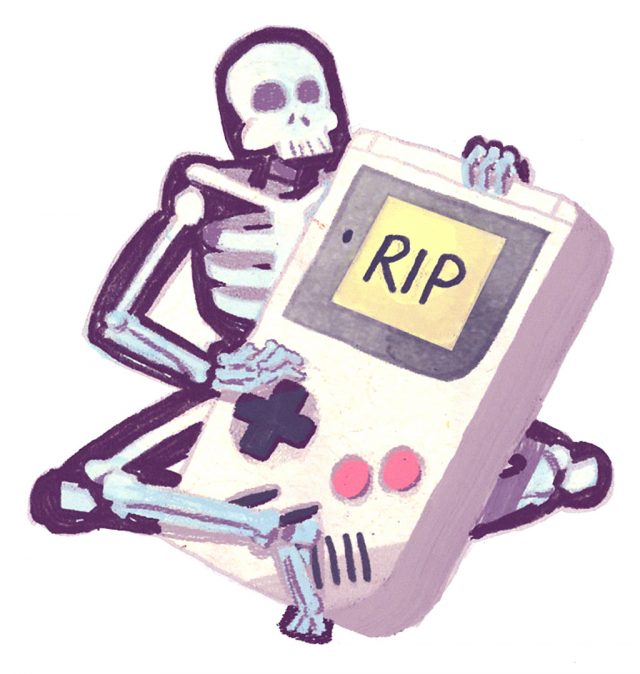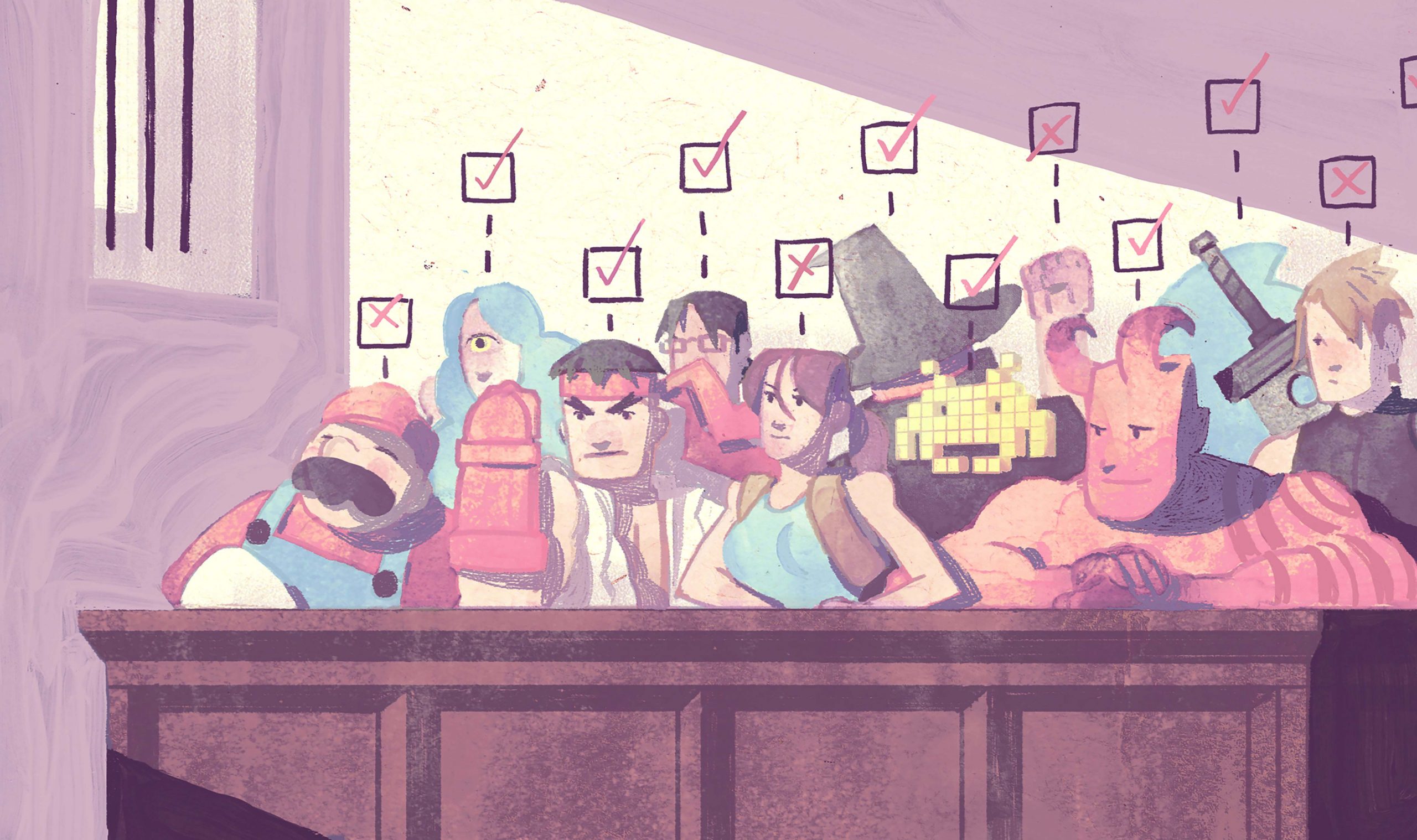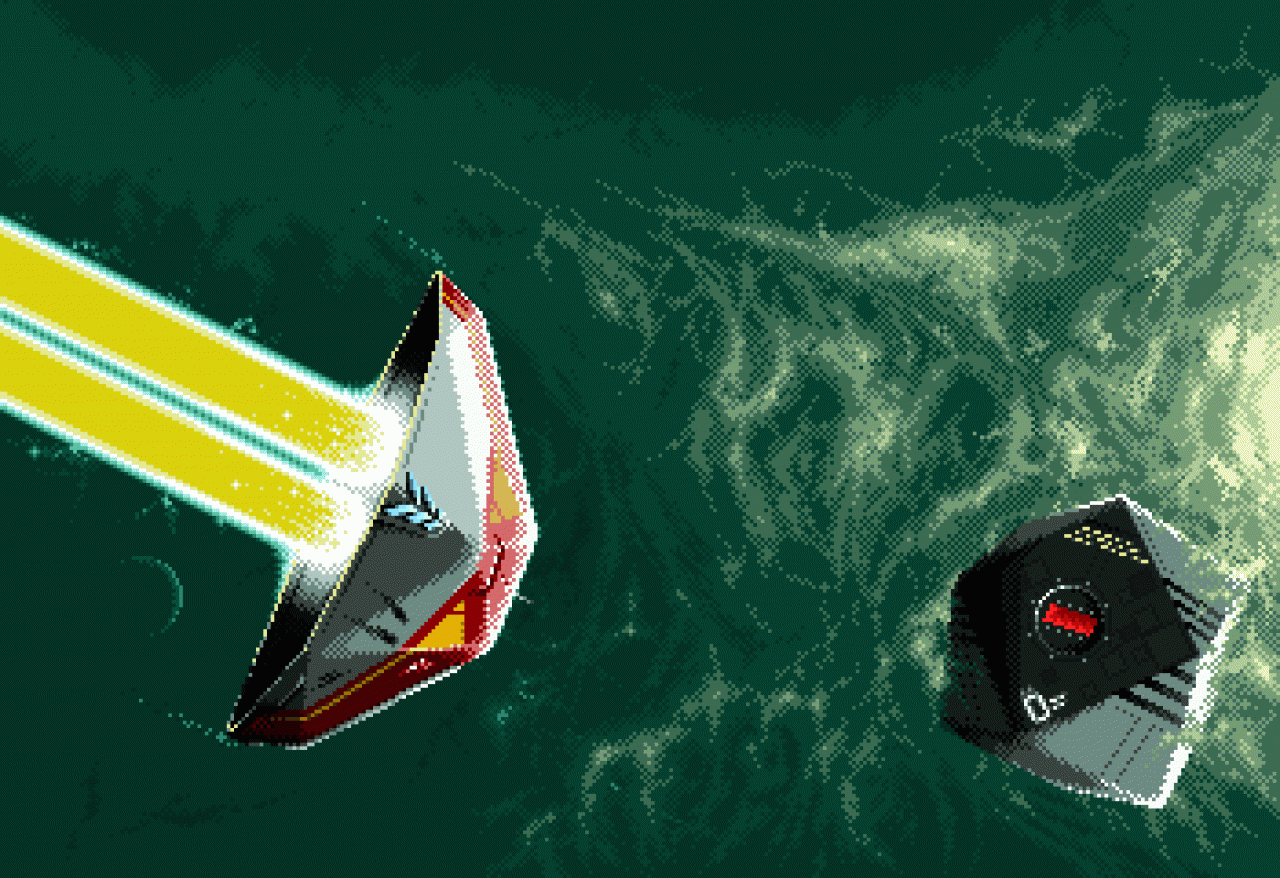Videogames and the English Courts
What the dusty tomes of English law can teach us about videogames
Videogame historians don’t know how lucky they are. They study a culture and a period whose heroes and villains are still around to tell their stories first-hand.
Consider those less fortunate historians, who have to make use of whatever documents have survived. Often they must submerge themselves in the records of institutions officious enough to produce and retain huge stacks of paperwork, from which it’s then possible, with enough historical interpretation, to glimpse the society that generated them. The Papacy is one such institution. Apparently 1990s Sega comes pretty close.
The English legal system is another. English law is based on precedent: the idea that the solution to most problems can be found by looking at how similar problems were solved in the past and applying the same principles. That system only works if lawyers and judges know what the previous solutions were – which means the system has produced hundreds of years’ worth of written records of the outcomes of real disputes, each of which introduces a cast of characters who have reached some kind of impasse in their dealings with each other, and describes how the issue was resolved.
Court judgments are useful to historians for two reasons. One, in recording facts they fossilise a huge amount of otherwise trivial detail about the kinds of things that people argued about and the lives they led. Two, in recording the court’s conclusions they serve as a fascinating chronicle of the attitudes of the judiciary, and by extension those of the (typically highly educated and privileged) class from which they came: just as folktales tell you about how ordinary people thought the world ought to behave, the law reports tell you about the Establishment’s view, the only difference being that the Establishment’s wishes came true.
Videogame historians don’t have to scrutinise the law reports to find out what ancient videogame culture was really like. But are the law reports worth studying anyway? What do they preserve for future generations about the place of videogames in English life over the last few decades? And what can they tell us about how the English Establishment reacted to a new form of culture, as it emerged from the chippies and seaside arcades and took its place in the cultural mainstream?

The Gaiden Tribute of Modern Babylon
I’ll warn you at the outset. The gaming community does not emerge well from this.
From the 1980s onwards, videogames mainly feature as the backdrop to a huge number of poorly executed thefts. In March 1985 a man attempted to burgle a youth club in Thornaby-on-Tees, ‘intending to steal money from the space invader machine’; after failing to get any money out he gave up and set the youth club on fire instead, and stayed around long enough to be stopped by the caretaker.1 In October 1985, a man was arrested with two packets of batteries under his sweater; when asked by the police why he had them, he said that they were ‘for his space invaders game’, which on further investigation also turned out to be stolen.2 In 2003, an attempted burglary was foiled when the burglar, leaving a burgled house wearing a bulging coat, dropped a videogame from the coat when he was spotted. (The judgment helpfully records, ‘He was obviously very drunk.’)3
My favourite is the burglar who – after having been spotted leaving a burgled flat carrying DVDs and videogames, running away from the police, and being caught – is recorded weathering his interrogation with the elegance and flair we all secretly know is the best we’d be able to manage in those circumstances: ‘He was asked who the items belonged to. He said, “My mate”. When asked who his mate was, he said he did not know.’4Sometimes, at least, it is possible to trace the progress of technology through this bleak refrain, as we can observe the nature of crime subtly changing with the times. For example, a 1997 case records a man’s conviction for copyright infringement over a bulletin board system (the BBS was a precursor to the World Wide Web), while later cases show the focus of enforcement activity shift, first towards the prosecution of modchip sellers, and then to the operators of torrent sites.
And if it makes you feel any better, the courts do at least record some crime on the part of the businessman (in his suit and tie). If anybody reading this was bought a ZX Spectrum bundle from Dixons for Christmas 1987 which they thought would contain Mario Bros. and Donkey Kong but which didn’t, you might be pleased to know that Dixons’ comeuppance, in the form of a trading standards prosecution, is on the record forever.5 There is also a permanent shrine to that PC Zone coverdisk containing a demo of Kingpin unrated by the British Board of Film Classification (which I bought; sorry Mum) in the form of the ensuing prosecution of WH Smith for breach of the Video Recordings Act.6
We can also take comfort in the fact that the motives were not always financial; there is also evidence of crimes of videogaming passion. The law reports immortalise the two friends who, in a pub in Alvechurch, Worcestershire in February 1999, ‘had an argument about computer games’ which led to one of them smashing a half pint glass into the other’s face.7 In fairness, Final Fantasy VIII had just come out in Japan, so it was a fractious time.
Finally, sometimes videogames featured not as the motive or the means, but as the hapless alibi. In one case, a man was charged with arranging for his wife to be murdered by his new lover, it being alleged that they had been in contact by text message while the murder was carried out. His story was that he had been playing a football videogame with a friend: since it was ‘complex and required concentration and deft manipulation of the controls by each player’, he could not have been coordinating a murder at the same time. His defence was foiled when the court heard evidence from Player 2 that the game had been ruined by Player 1’s constant pausing – ‘it did affect the pleasure of the game […] I thought he was pausing so often it was a diversionary tactic’ – proving that there had been time for him to text his lover after all.8
Amazingly, that wasn’t the only time a defendant maintained his innocence on the grounds that the game he was playing was too compelling. In 2007 a man charged with dealing drugs, who had allegedly been in the room while the drugs were packaged, claimed that he did not know what was going on because he had been busy playing what the court quaintly called ‘the Streetfighter game’. The Court of Appeal dismissed his story as implausible for a number of reasons, one of which was: ‘we find it difficult to believe that the appellant should have spent as long as half an hour playing an arcade game when he only had £1.00 to spend’ – perhaps the first recorded example of arcade trashtalk in an English judgment.
Lessons
Obviously, one shouldn’t read too much into this. In any context, court judgments will inevitably focus disproportionately on crime, because dealing with crime is one of the courts’ primary functions.
There are nevertheless three interesting things about these judgments.
The first is the detail in the periphery, fascinating little gems which might be new even to somebody who grew up immersed in videogame culture. One case in 2002 concerns a racially aggravated assault committed against a man (apparently not a postman) while he was delivering a ‘cheat book’ to a client: was there really a delivery network for cheat books!?9 Another case in 2003 records that, in a fight between two adult men which turned sour, one had put the other in a headlock while shouting ‘I am the people’s champion’ – explained by the court as ‘a reference to a wrestling computer game that he […] had played earlier that night’. Were the playfights of adult men in the early 2000s punctuated by quotes from WWF Attitude?10
The second interesting feature is the total absence of any visible sense of moral panic on the part of the courts. You might expect that an institution whose primary experience of videogames was as a backdrop to youth crime would start to fear games as a harmful influence and react accordingly, particularly as Parliament was periodically panicking about the same thing.11 On the contrary, despite criminals trying their best to take advantage of social apprehensiveness about videogames by blaming them for their crimes, the courts seem to have been sceptical: in 1999, a 17-year-old convicted of killing his grandmother told a jury that he had not meant to do it but that he had ‘thought he was in a computer game and was seeing what he described as “creatures”’; the jury chose instead to believe a fellow inmate who said the defendant had confessed to him that it was a botched burglary.12
Finally, in an odd way, some of these judgments emphasise how much importance was accorded to videogames by those involved. The report of one conviction for robbery in 2003 records how the mugger approached his victims with a knife near Camden Canal and ‘said that he would kill the victims if they did not hand over their mobile phone’: he took the phone, searched the victims’ bags, found a ‘Gameboy computer game console’, and then gave the phone back. He was recorded saying ‘It is either the Gameboy or your life’, having apparently lost interest in the phone.13
Likewise, a judgment from 2000 records a bizarre episode in which two people forced their way into an acquaintance’s house, apparently seeking the return of their child’s ‘computer games bag’: after stabbing the man in both thighs and threatening to shoot him, they took a hi-fi, some CDs and some money, but stopped before leaving to ask him to ‘sign a receipt saying that they were in exchange for the computer games’ – it obviously being important to have a paper trail.14 In the end, there can be no greater testament to the centrality of videogames in English life by the early 21st century than the fact that even the long-running saga about the legality of the UK’s anti-terrorism legislation – which saw a huge amount of litigation over the course of a decade, producing judgments on the highest questions of principle which will be studied by law students for generations to come – focused for a brief moment on whether a terror suspect should be allowed to keep an Xbox 360 in his flat. In the end, he was allowed to keep it as long as the online functionality was disabled: condemned, like a mythical king of old, to practice Trials HD forever but never to show off his scores.15
The judiciary
So what can we learn about the attitudes of judges themselves towards videogames?
The starting point is to recognise that many of the judges who were deciding cases in this period received their legal training at a time when ‘gaming’ had only one legal meaning (one which it still has in some fields of policymaking): gambling on a game of chance.
For decades the leading case about the nature of a ‘game’ was a dispute about whether games of bingo played at different clubs all amounted to the same ‘game’ for the purposes of gambling law. In that case, Mr Justice Widgery had tried to define a ‘game’ by saying: ‘the ordinary man, when talking of playing a game, is talking of something which involves […] excitement and fun in the common pursuit by a number of competitors of a similar and known object’.
Videogames broke that definition almost from the moment they existed. The very first videogame mentioned in a reported English case (pub quizzers take note) was Frogger, which fails the test purely by virtue of being single-player.16 The case concerned Sega’s efforts to take action against a company producing unlicensed arcade cabinets for pubs, and nothing turned on the nature of the game; after an introductory paragraph explaining that a ‘video game’ is ‘a small television set which is programmed to give pictures in the nature of games which the viewer can control and play’, the Court retreated to the more familiar territory of the principles governing the 19th century equitable bill of discovery.
With that in mind, there are three types of judgment which tell us something about how judges grappled with the new medium of videogames: those where a videogame is mentioned in passing; those where a videogame is the subject matter of the case but not relevant to the issue in dispute; and those where the dispute turns on something inherent in the nature of a game.
Passing references
You will already have noticed that some of the references to videogames by judges in the cases above read like reports radioed back to an alien world. I’ve mentioned ‘the Streetfighter game’, ‘the space invaders game’ and ‘the space invader machine’. Other culprits include the quintessential Dad habit of using the word ‘Gameboy’ to mean any handheld of any era – which makes it difficult to know, for example, which model was deemed to be worth four wraps of heroin in 200517 – or the quaint reference in a judgment from 2012 to a man intimidating a witness by sending her a card that contained ‘a picture of a “hit man” computer game’.18
This sort of looseness of language has no effect on the function of a court judgment, which is to serve as a guide for future lawyers and judges: principles of law do not depend on precisely which shoot ‘em up a drug dealer was playing when he was caught. But it can still be significant to us in reading the attitudes of the Establishment, in two ways.
First, it obviously does not fill the reader with much confidence in the ability of the courts to grapple with videogames when required to do so – of which more to come.
Second, and more interestingly, the repeated use of the lowercase ‘space invaders’ – apparently as a genericised metonym for videogames in general (unless England’s criminals are very particular in their shoot ‘em up tastes) – is an indicator of how much cultural penetration Space Invaders had among a class which otherwise had little knowledge of or interest in games. Never mind that it was so big in the 1970s and 1980s that (a) Martin Amis wrote a book about it and (b) the book was reviewed in the London Review of Books by a man who is now a leading authority on Anglo-Saxon literature:19 it also seems to have been the only foothold which many judges were able to find in their efforts to describe a videogame.
Games as subject matter
When you look at cases where videogames were slightly more central to the dispute, the nature of judges’ attitudes becomes clearer. You notice immediately the regularity with which they express themselves in an outlandishly fogeyish way – and you start to get the strong sense that they are rather enjoying themselves.
A mild example of this can be found in a 2001 judgment in relation to a dispute about what should happen to a contract for the distribution of the game Carmageddon after it was banned from sale to under-18s in France. Lord Justice Rix, giving the leading judgment in the Court of Appeal, began by describing it as “an interactive entertainment software product, or what my children would call a computer game.” He went on to describe what one is required to do in a game of ‘Carmaggedon’ (resolutely misspelled throughout the entire judgment): ‘The essence of the game is that the player drives a car in such a way as to cause it to injure pedestrians or destroy property’20 – a description that makes you want to complain that it is unfairly reductive, before realising that it is distressingly accurate.
The following year, when Sony pursued the manufacturer of the Messiah modchip in the courts, the Chancery judge began his summary of the media giant’s region controls with ‘Sony have divided the world up into three parts’ – which anybody trained in interpreting the language of judges will recognise as a tongue-in-cheek reference to the opening words of Caesar’s De Bello Gallico, a Latin public-school staple about a world power’s rise to dominance.21The report of Sony’s 2006 claim against the operators of the import seller Lik-Sang.com – yes, them – records in beautifully unwarranted detail the steps which His Honour Judge Fysh took to satisfy himself that it was selling products in the UK which infringed copyright. In his judgment, Judge Fysh carefully set out the fact that, before reaching a conclusion, he had retired into his chambers to visit the website and to have a go on a PSP copy of LocoRoco which had been procured from it by the Claimant. (His verdict on LocoRoco? ‘There is no doubt that this box and its contents are genuine, are made by Sony and were intended for distribution and sale in Japan. Neither do I doubt that the box and its contents incorporate a number of items of intellectual property’. Reads like a 7.)
The clearest example of a Judge revelling in fogeyism about the videogames industry, however, appears in the long-running dispute between the World Wildlife Fund and the World Wrestling Federation over the use of the ‘WWF’ acronym. The Fund had succeeded in establishing that the Federation could not use ‘WWF’, but the Federation argued that it should be allowed to sell videogames which contained the old ‘WWF’ logo because it would be too difficult to reprogram them (so they would otherwise have to be scrapped), and because there was a public interest in ensuring that the games were made available in some form.
That line of argument springs from a very famous case from the 1970s about village cricket22 , in which a person succeeded in persuading a court that cricket balls flying into his property amounted to an unlawful nuisance, but the court (led by the avuncular and much-loved Lord Denning) refused to grant an injunction to stop it because of the intrinsic value of cricket in English village life: ‘In summer time village cricket is the delight of everyone.’
The court hearing the WWF case made pretty clear that it thought the argument that videogames were in the same category was hilarious. Although it was a fairly peripheral issue, the judgment begins by recounting the Federation’s submission on the point, and adds: ‘How Lord Denning would have reacted to that submission, we do not know.’ Nevertheless, when reaching that point of its legal analysis, it rejected the argument not because of any disparaging judgment of videogames’ cultural worth, but on the grounds that even if WWF games ceased to be available, ‘the evidence does not suggest that there will be any lack of others to fill the gap.’
Those examples are significant for two reasons.
First, considered against that background, the courts’ apparent failure to grapple with the language of videogames starts to look not clueless but whimsical. It becomes much clearer, for instance, that when a Court of Appeal judge in a 2010 case described videogames as ‘electrical games’, he was taking the mick.23
Second, the approach of the court to the WWF case – gently mocking the idea that videogames are a social good, but still ultimately taking as given their cultural and economic importance – points towards the most interesting thing the cases show about how judges have approached videogames over time: that when they were required to decide something relating to videogames, they were actually really good at it.

Hard mode
In 1985, Westminster City Council had become concerned about the Crystal Rooms arcade on Cranbourn Street in London. They wanted to regulate it, so they invoked their powers under the Cinematograph Acts, which allowed them to restrict the provision of ‘exhibitions of moving pictures’. They argued that that definition encompassed videogames. The arcade took them to court.
The Council argued that it was ‘an essential part of the game that moving pictures are exhibited and looked at in order for the viewer to participate in the game’, and that videogames therefore involved an ‘exhibition of moving pictures’. The arcade argued that videogames were not ‘exhibitions’ because (i) the player (not the ‘exhibitor’) determines which pictures appear, in what sequence and for how long, and (ii) exhibitions are seen for their own sake, whereas in the case of a video game, ‘the pictures which appear upon the screen are seen by the player only as a means to an end, namely the playing of the game. They have no merit of their own.’
The High Court and the Court of Appeal both held that the Council’s powers allowed it to regulate videogames. But when in 1988 the case reached the judicial committee of the House of Lords (then the UK’s highest court), Lord Griffiths of Govilon – a graduate of Charterhouse and Cambridge, who had fought in the Welsh Guards during the Second World War, had played first-class cricket for Glamorgan CCC, and would go on to be President of the MCC and of the R&A Golf Club, two of the most prestigious offices in the Establishment world – stood up for the uniqueness of videogames. He began his decision: ‘In recent years video games have become a familiar feature not only in amusement arcades but in many other places such as waiting rooms, public houses, cross-channel ferries, shops, clubs and so forth. There can be few of us who have not tried our hand at one time or another at “space invaders” or some similar game.’ He and the rest of the court went on to conclude that, as a matter of common sense, the activity of playing videogames was fundamentally different from that which legislation governing ‘cinematograph exhibitions’ was plainly intended to cover.
Over the ensuing decades, the courts confronted a number of increasingly technical cases with similar sensitivity.
For example, the Messiah modchip case (above) featured a thoughtful and comprehensive analysis of the import market, ‘Hong Kong Silvers’, and homebrew development, before concluding that ‘One would have to shut one’s eyes to reality’ not to conclude that the Messiah modchip would lead to extensive unlawful copying.24
A case from 2006 about arcade pool featured a detailed analysis of the features of two rival games (Jackpot Pool and Pocket Money) in order to determine whether one had been copied from the other25 (it also contained, in a description of the home console and PC market, an unforgiveable slight on keyboard controls as ‘generally considered to be less satisfactory than the use of a dedicated games module’, but I will let it slide).
A case from 2009 about the development of a piece of anti-cheating software contains a remarkable potted history of online gambling games, charting their growing sophistication from their origins at a time when (according to one witness quoted in the judgment) ‘it was mind-boggling to even imagine that anyone would trust an online game to spin a slot machine. It is like calling someone over the phone and saying heads or tails and they would say “heads”, “you lose.”’26Two cases from 2014 stand out above all. In the first, a patent dispute between Philips and Nintendo over the Wii motion controller, Mr Justice Birss delivered a phenomenal analysis of, among other things, the history of computer graphics, analysing how motion had been simulated through the ages: his analysis of how Doom depicts 3D movement (‘The graphics do not attempt to animate or represent the player’s own avatar other than to depict the weapon being held by the avatar [….] As the player advances in Doom the image bobs up and down to represent the result of the head of the avatar moving as it walks forward’) was accompanied by a screenshot, which I can only hope the Judge took himself.27
In the second, a tax tribunal was required to determine whether a ‘Spot the Ball’ competition qualified as a ‘game’ for tax purposes. It was not a case about videogames, but Mr Justice Norris took the opportunity to revisit Mr Justice Widgery’s definition of a ‘game’ from 1967. He quoted that definition, and concluded:
‘Those are words spoken in their time and were never intended to be comprehensive or to be treated as if they had been enacted. Games played with machines, or computer or video games may require the significance of the element of ‘common pursuit by a number of competitors of a similar and known object’ to be re-assessed (though many such games do display that characteristic): but the elements of entertainment, excitement and fun remain, I think, the elements of a true game.’28When I started researching this piece, I expected to see a story of a judiciary being confronted with a new and unfamiliar medium, drowning in concepts they were unable to understand before slowly coming to terms with the technological context. We all expect an English judge to be among the least technologically capable people in the Western world: in Orwell’s phrase, ‘that evil old man in scarlet robe and horse-hair wig, whom nothing short of dynamite will ever teach what century he is living in’.29 But the most striking thing about these cases is that, for all the fogeyism the judges were happy to espouse, whenever something to do with the nature of videogames was important to the outcome of the case, they wholly embraced it and scrutinised it with the care it deserved.
It is particularly remarkable when you think about how much the average gamer knows or cares about the way the law works (remember believing that downloading a ROM was legal if you deleted it within 24 hours?). And yet we can reasonably confidently expect people at the top of the legal profession to care enough about how games work to reach the right answer.
But after all, you don’t get to the position of laying down the law in one of the oldest legal systems in the world without having a deep interest in systems and rules, a characteristic which, incidentally, is highly conducive to an interest in videogames. Maybe the English judge is a nerd at heart. So if you ever meet Lord Griffiths of Govilon, ask him for his high score.
Footnotes
- 1 R v Michael Andrew Cummins (1986) 8 Cr App R S 7
- 2 R v Gary Ealand (1986) 83 Cr App R 241
- 3 R v Outhwaite ((2003)) EWCA Crim 611
- 4 R v D ((2009)) EWCA Crim 2426
- 5 Denard v Smith and Dixons Ltd (1990) 155 JP 253
- 6 Bilon v WH Smith Trading Ltd ((2001)) EWHC Admin 469
- 7 R v Gould (2000) 2 Cr App R S 173
- 8 R v Marsh ((2009)) EWCA Crim 2696
- 9 DPP v McFarlane ((2002)) EWHC 485 (Admin)
- 10 R v Ian Frankcom ((2002)) EWCA Crim 1084
- 11 ‘They play truant, miss meals, and give up other normal activity to play ‘space invaders’. They become crazed, with eyes glazed, oblivious to everything around them.’ George Foulkes MP, 20 May 1981
- 12 R v Luke Hamilton (1999) 1 Cr App R S 187
- 13 R v Luke Hamilton (1999) 1 Cr App R S 187
- 14 R v Carl Alan Ali (CA, 8 August 2000)
- 15 ”SSHD
- 16 Sega Enterprises Ltd v Alca Electronics and others ((1982)) FSR 516
- 17 R v Lanbrianou ((2005)) EWCA Crim 1554
- 18 R v McDonald ((2012)) EWCA Crim 809
- 19 The book is Invasion of the Space Invaders: An Addict’s Guide to Battle Tactics, Big Scores and the Best Machines, by Martin ‘I am a serious’ Amis.
- 20 SCI v Titus Sarl ((2001)) EWCA Civ 591
- 21 Sony Computer Entertainment v Paul Owen ((2002)) ECDR 27
- 22 Miller v Jackson ((1977)) QB 966
- 23 R v van Garden ((2010)) EWCA Crim 2702
- 24 Sony Computer Entertainment v Paul Owen ((2002)) ECDR 27
- 25 Nova Productions Ltd v Mazooma Games Ltd ((2006)) EWHC 24 (Ch)
- 26 ”Cranway
- 27 Philips v Nintendo ((2014)) EWCA 1959 Pat
- 28 HMRC v IFX ((2014)) UKUT 0398 TCC
- 29 George Orwell, The Lion and the Unicorn





